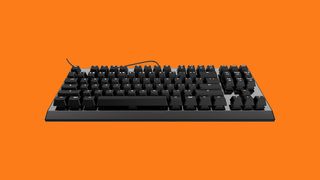This may very well be the perfect gaming keyboard
It's mechanical, analog and portable – perfect for LAN parties

We've seen a lot of mechanical keyboards pop up lately, but here's something completely different: an analog and compact, ten-keyless (i.e. sans number pad) effort from Dutch hardware maker Wooting.
The Wooting One is an analog keyboard as opposed to a traditional digital keyboard. With the latter, you press a key and it registers, and that's that – it has two states, either being pressed or not.
However, an analog keyboard registers how far down you press the key in increments. This could vastly improve some PC game experiences.
For example, a racing game: the further down you press the key, the faster you'll accelerate – or the harder you turn the steering wheel – just like when using a controller.
How about a shooter? With this keyboard, you could fine tune your actions, like strafe very slowly or peek out around a corner stealthily, if you depressing the relevant key slightly.
No numpad, no nonsense
Again, the Wooting One is tenkeyless, meaning they've ditched the number pad to make it far more compact. That's handy for portability and fitting onto small desks at LAN parties.
Furthermore, it brings your left hand on the keys and your right hand on the mouse closer together for a more comfortable play experience.
Get daily insight, inspiration and deals in your inbox
Get the hottest deals available in your inbox plus news, reviews, opinion, analysis and more from the TechRadar team.
The Wooting One also touts RGB backlighting – natch, for a gaming keyboard – a detachable braided cable and a removable keyboard top-plate, so you can switch it for another color, if you prefer.
So, when is this thing out? Sadly, there's firm release date yet. OC3D spotted this one and they reckon the Wooting One will ship globally sometime this year for a midrange price. In a word, w00t.
- These are the best gaming keyboards of 2016
Darren is a freelancer writing news and features for TechRadar (and occasionally T3) across a broad range of computing topics including CPUs, GPUs, various other hardware, VPNs, antivirus and more. He has written about tech for the best part of three decades, and writes books in his spare time (his debut novel - 'I Know What You Did Last Supper' - was published by Hachette UK in 2013).
Most Popular

